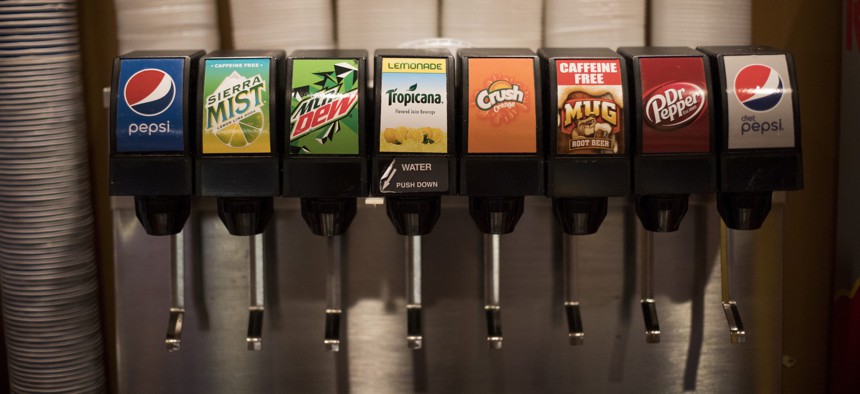Connecting state and local government leaders
California enacted a law in 2018 that creates a huge roadblock for cities that want to tax soda and other sugary beverages. That statute now faces a challenge in court.
Part of a California law that threatens to deprive local governments of large sums of sales tax revenue if they impose taxes on sugary drinks violates the state’s constitution and should not be enforced, a lawsuit filed in state court on Monday claims.
A nonprofit group and a Santa Cruz city council member, acting as a private citizen, lodged the lawsuit against the state. It challenges a law—Assembly Bill 1838—that state legislators passed in 2018 effectively blocking new local taxes on soda and other sugary drinks until 2031.
“It is imperative that local governments have decision-making power and all tools at their disposal to protect the health and safety of their residents,” Sarah de Guia, CEO of ChangeLab Solutions, a group that is supporting the lawsuit, said in a statement.
“Abusive laws like this one harm families and communities, and they should have no place in California or anywhere else,” de Guia added.
The lawsuit is one of the latest skirmishes around the country involving state laws that “preempt” local government authority.
It comes at a time when cities and counties nationwide are seeing tax and fee revenues eroded by the coronavirus pandemic, and as preemption conflicts have flared between state and local officials over policies meant to prevent the spread of the virus.
Soda-makers and other beverage companies have turned to state legislatures and ballot measures as they have attempted to block new taxes on sugary drinks that cities—such as Philadelphia, Seattle and Boulder, Colorado—increasingly adopted over the past five years.
The rationale behind taxing soda is similar to taxing other goods that can contribute to health problems, like liquor or cigarettes.
Proponents contend that soda and other sugar-laden beverages increase health risks tied to obesity and diseases like diabetes. And they argue that these drinks are marketed to, and consumed more heavily in, poor and minority communities.
Critics counter that the taxes are regressive, falling disproportionately on people with lower incomes, and that taxing sugary drinks amounts to a “nanny-state” policy, where the government tries to dictate what types of beverages people should consume.
Some opponents also question whether the taxes actually help improve health outcomes.
Between 2014 and 2016, ballot measures taxing sugary drinks won voter approval in Berkeley, San Francisco, Oakland and Albany, California.
After these taxes were adopted, the American Beverage Association and California Business Roundtable pumped millions of dollars towards a ballot proposition designed to impose significant new limits on the power California and its localities have to levy taxes and fees.
That initiative drew strong opposition from local governments and organized labor. One state lawmaker called it a “nuclear weapon” targeting local government budgets. The proposition’s backers agreed to withdraw it if lawmakers approved AB 1838, which they did.
A provision in that law says that if a court finds that a local government has levied a tax on “groceries,” including carbonated and non-carbonated non-alcoholic beverages, the state is to stop collecting sales and use taxes that would otherwise be due to that locality.
Given that some California cities rely on those taxes for upwards of 40% of their general fund revenues, this would gut their budgets.
The lawsuit contends that this aspect of the law violates the state constitution in a number of ways—for instance, by seeking to penalize cities for exercising power they’re entitled to have over their own affairs and discouraging citizens from petitioning for soda taxes.
Nonprofit group Cultiva La Salud, and Martine Watkins, the Santa Cruz city council member, are the two plaintiffs in the case.
They’re asking the court to declare that the sales and use tax provision is unconstitutional, to issue an injunction prohibiting the state from enforcing it, and to order the state agency responsible for collecting the sales and use taxes not to implement the provision.
That agency, the California Department of Tax and Fee Administration, is named as a defendant in the case, along with its director. The agency did not respond to a request for comment about the lawsuit on Monday, neither did the California Attorney General’s office.
Over the past decade, state-local preemption battles have played out over a wide range of issues, such as tobacco use restrictions, labor rights and environmental safeguards.
“In the last 10 years we have seen a steep increase in the nationally coordinated, industry-driven use of preemption,” Kim Haddow, director of the Local Solutions Support Center, a group that focuses on preemption issues, said during a call with reporters on Monday.
“The misuse of preemption has grown dramatically,” she added.
Bill Lucia is a senior reporter for Route Fifty and is based in Olympia, Washington.

NEXT STORY: Governors Raise Concerns About Trump’s Unemployment Benefits Order




